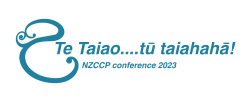NZCCP PRE- & POST-CONFERENCE WORKSHOPS 2023
Thursday 23, Friday 24 & Monday 27 March
James Cook Hotel Grand Chancellor, Wellington
REGISTER HERE for FRIDAY & MONDAY WORKSHOPS
REGISTER HERE for Thursday 23 March, 9am-4.30pm: He Puna Whakaata: Presented by a Mātauranga Māori specialist & a clinical psychologist: He Puna Whakaata (Te Rau Ora #1 - Promo.mp4) is a kaupapa Māori based programme that helps to identify someone’s values, their origins and to dive that little bit deeper into their values. He Puna Whakaata has a suite of resources in which participants are taught how to use in practice, the suite includes the Whai Tikanga cards, Korurangi, Te Whare Tapa Whā and an updated Pleasant Event Schedule to name a few. He Puna Whakaata is a therapeutic programme that is aligned with Māori preferences and models of practice and wellbeing.
The Whai Tikanga cards are values cards that steam from the Māori Worldview. The cards have a Māori value and its English translation. They are aligned to a whakataukī, whakatauākī or tongikura (metaphors that stem from Te Ao Māori). We spend time in the wānanga exploring the understanding of some of the whakataukī, whakatauākī and tongikura, so participants leave with the basic knowledge on how to wānanga.
This training workshop is an interactive wānanga where every participant gets to experience what it is like to be a client and how effective each stage of He Puna Whakaata is at getting whanau to kōrero, getting whanau to remember, getting whanau to understand their why and ultimately getting whānau to want to make change for the better.
Wānanga structure usually looks like this:
- Mihi/Welcome/Whanaungatanga
- Quiz (on pre material)
- Metaphors
- Whakataukī
- Whai Tikanga Card sort (individual)
- Whai Tikanga Card sort (group)
- Application of values to Te Whare Tapa Whā
- Korurangi
- Reflections, Closing, Evaluations
Friday 24 March, 9am-12.30pm: Julia Rucklidge - Nutritional Therapies for Psychological  Symptoms: How to implement nutrition into your practice. Professor Julia Rucklidge has become well-known for her ability to succinctly communicate the latest research relating to nutrition and mental health. In this workshop, Prof Rucklidge will discuss the data that describe an alarming picture of food choices serving as risk factors to all kinds of psychiatric problems. She will describe dietary patterns and food choices that have been supported by scientific evidence. She will then introduce the recent paradigm shift of using broad spectrum micronutrients to treat these challenges, reviewing the hypothesized mechanisms of action and the evidence to date. The talk will challenge our current treatment regime for mental disorders and suggest one alternative course of action. She will also provide clinically relevant tips and recommendations that can be immediately used to enrich and broaden therapeutic interventions in the real world.
Symptoms: How to implement nutrition into your practice. Professor Julia Rucklidge has become well-known for her ability to succinctly communicate the latest research relating to nutrition and mental health. In this workshop, Prof Rucklidge will discuss the data that describe an alarming picture of food choices serving as risk factors to all kinds of psychiatric problems. She will describe dietary patterns and food choices that have been supported by scientific evidence. She will then introduce the recent paradigm shift of using broad spectrum micronutrients to treat these challenges, reviewing the hypothesized mechanisms of action and the evidence to date. The talk will challenge our current treatment regime for mental disorders and suggest one alternative course of action. She will also provide clinically relevant tips and recommendations that can be immediately used to enrich and broaden therapeutic interventions in the real world.
Overview and Learning Intentions
- Why it is essential to consider the role of nutrition/diet in understanding and treating psychological distress
- Research on dietary patterns and their role in the expression and treatment of mental health problems
- Learn easy ways to help clients improve diet
- Understand why in some cases additional nutrients may be necessary in addition to a good diet
Julia is a Professor of Clinical Psychology in the School of Psychology, Speech and Hearing at the University of Canterbury and the Director of Te Puna Toiora, the Mental Health and Nutrition Research Lab and co-author of The Better Brain. Originally from Toronto, Canada, she completed her PhD at the University of Calgary in clinical psychology, and in 2000, she immigrated to New Zealand. She has become well known for her research investigating the interface between nutrition and mental health, having published over 150 empirical papers, frequently featuring in the media on her work and being the recipient of numerous local and international awards, including the Ballin Award from the NZ Psychological Society for significant contributions to the development or enhancement of clinical psychology in Aotearoa New Zealand, being named as a Woman of Influence in New Zealand in 2015, 2018, and 2021, and a Braveheart award for her contribution to making Christchurch a better place to live. In 2020, she created a free EdX online course for the public on mental health and nutrition. She is also a longstanding member of the Health Practitioners Disciplinary Tribunal (HPDT). Her 2014 TEDx talk has been viewed close to 5 million times. Julia is passionate about translation of research to practice and making nutritional interventions for the brain mainstream.
Friday 24 March, 1-5pm: Dr. Diana KOPUA & Tohunga Mark KOPUA - Te Kurahuna: Mahi a Atua: Te Kurahuna: Mahi a  Atua is the deployment of Mātauranga Māori, Pūrākau, Maramataka, Feedback Informed Treatment and associated techniques and knowledge that support this paradigm shift. As the founder and Manukura of Te Kurahuna: Mahi a Atua, Psychiatrist Dr. Diana Kopua will share Te Kurahuna’s vision, strategy and outcomes as they expand to create social impact. The point of difference for Te Kurahuna is ‘pūrākau.’ This trademark is woven into Te Kurahuna- Mahi a Atua strategy creating new opportunities with iwi Māori and communities to reconceptualise distress, confidently design and implement frameworks and strategies that affirm Māori whakapapa and achieve whānau ora.
Atua is the deployment of Mātauranga Māori, Pūrākau, Maramataka, Feedback Informed Treatment and associated techniques and knowledge that support this paradigm shift. As the founder and Manukura of Te Kurahuna: Mahi a Atua, Psychiatrist Dr. Diana Kopua will share Te Kurahuna’s vision, strategy and outcomes as they expand to create social impact. The point of difference for Te Kurahuna is ‘pūrākau.’ This trademark is woven into Te Kurahuna- Mahi a Atua strategy creating new opportunities with iwi Māori and communities to reconceptualise distress, confidently design and implement frameworks and strategies that affirm Māori whakapapa and achieve whānau ora.
POST-CONFERENCE WORKSHOP
Monday 27 March, 9-4pm: Dr Paul Skirrow & Dr Nic Ward - Cognitive Assessment for Non- Neuropsychologists: This workshop has been developed as a practical training in cognitive assessment, for those who would not consider themselves ‘specialists’ and do not have the neuropsychologist scope of practice. Many of clinical psychologists are regularly asked to undertake cognitive assessments, or may need them to fully formulate our clients’ difficulties. However, many of us do not consider ourselves ‘expert’ in cognitive assessment and may not have used tests regularly since we qualified.
Neuropsychologists: This workshop has been developed as a practical training in cognitive assessment, for those who would not consider themselves ‘specialists’ and do not have the neuropsychologist scope of practice. Many of clinical psychologists are regularly asked to undertake cognitive assessments, or may need them to fully formulate our clients’ difficulties. However, many of us do not consider ourselves ‘expert’ in cognitive assessment and may not have used tests regularly since we qualified.
 This workshop is intended to increase your confidence in completing cognitive assessments by:
This workshop is intended to increase your confidence in completing cognitive assessments by:
- Describing an overall approach to cognitive assessment, including the intersection between neurological injury, cognition and function.
- Helping you identify appropriate referral questions that are within your scope of practice and negotiate them with referrers.
- Updating your familiarity with the most widely used cognitive assessment tools in New Zealand, together with their strengths and weaknesses.
- Equipping you with potential brief cognitive batteries, that will allow you to answer key referral questions (without precluding more full neuropsychological assessment).
- Describing some of the complexities associated with the analysis and reporting of cognitive testing- including recommendations for ‘best practice’ in Aotearoa.
- Providing practical tools and treatment recommendations for use with adults and children with a range of cognitive difficulties.
The workshop will involve demonstration and discussion of the tools and how they are interpreted, and discussion of templates and techniques for use in clinical practice. We also intend to offer some hands-on-practice with tests and discussion of test interpretation.
Dr Paul Skirrow is a senior lecturer at Otago University in Wellington and Director of their upcoming Postgraduate Diploma in Neuropsychology. He has a background in research and service leadership in neuropsychology and neurorehabilitation in both the UK and New Zealand.
Dr Nic Ward is a Clinical Psychologist and Neuropsychologist with the Laura Fergusson Brain Injury Trust, where she works as the Clinical Lead for Psychology. She also continues to chair the New Zealand Special Interest Group in Neuropsychology (NZSIGN), which she has helped establish and develop since 2011
REGISTER HERE
NZCCP 2023 CONFERENCE

Saturday 25 & Sunday 26 March, 2023
James Cook Hotel Grand Chancellor, Wellington
